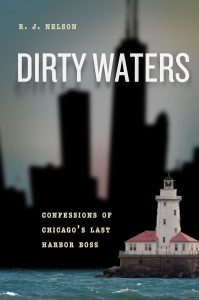Chicago Reader on Dirty Waters

From a recent Chicago Reader review of R. J. Nelson’s Dirty Waters: Confessions of Chicago’s Last Harbor Boss, the story of one city employee’s rise and fall as Chicago’s director of Harbors and Marine Services:
Dirty Waters, a fine chronicle of Nelson’s tenure as a city employee, begins with his first day on the job and concludes not long after he was ignominiously terminated by Forrest Claypool, then the Park District’s general superintendent. What Nelson encounters during that time will be familiar to anyone with a rudimentary knowledge of local government: parks department supervisors who demand permits for their personal boats, inept public-sector employees who receive high salaries due to political connections, and obfuscatory paperwork designed to deaden the enthusiasm and limit the geographic and civic access of ordinary boaters.
t a play-by-play account of Nelson’s time as harbor boss, Dirty Waters might get bogged down by inside-baseball accounts of bygone local politics. But there’s a certain Chicagoness to Nelson’s storytelling that’s highly entertaining—the book reads like a series of anecdotes being told by a lifelong resident of the city. Nelson can veer off on tangents, sometimes excessively so, but more often than not the asides keep the narrative interesting, provide valuable context, and in some instances add unexpected depth. A chapter titled “Harold” is ostensibly about Washington, but Nelson spends most of it describing racism he’s encountered in his lifetime, from his bigoted father to his participation in an early-1960s protest against the mistreatment of African-Americans.What also keeps things lively is the tone of Nelson’s writing, a chili bowl full of corner-tap talk, sensitive memoir, and detective fiction. At times the gumshoe similes soar: “New furniture and carpeting were ordered, but like reform in government the process took time while the stench of chain-smoked corruption lingered.” And there’s plenty of new information that should delight local readers, from the physical makeup of the harbors to the ins and outs of local yacht clubs to the secret laboratories under Soldier Field set up to study surface waves. Next time when someone asks why Chicago’s so corrupt, tell them it must be something in the water.
To read more about Dirty Waters, click here.
To read the review in full,, click here.